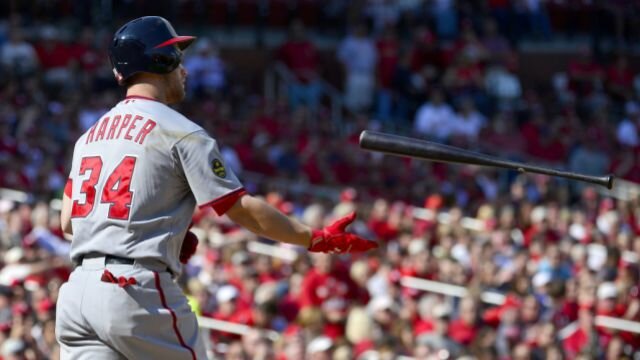The Washington Nationals and star outfielder Bryce Harper could potentially be facing a legal dispute following the 2014 season, according to Adam Kilgore of the Washington Post.
According to Kilgore, Washington was able to reach a verbal agreement with Harper merely minutes before the deadline for teams to sign their draft picks. Under normal circumstances, draft contracts almost always include an opt-out clause allowing the player to opt out of the contract when they become eligible for MLB salary arbitration, where players gradually receive raises based on performance from the previous season.
Harper’s draft contract was worth $9.9 million with a $6.25 million signing bonus. Players usually become eligible for arbitration after three full seasons of MLB service. However, players between two and three full seasons of service in the top 22 percent of that list can become eligible early, and are known as “Super Two” players.
Haper is due to make $750,000 for the 2014 seasons and $1.5 million in 2015. Needless to say, Washington is getting a total bargain for the 2012 NL Rookie of the Year and a two-time All-Star.
If Harper were able to opt out of the contract after 2014, however, Kilgore writes that Harper would probably make somewhere in the range of $4-7 million if he able to stay healthy and keep up his performance, which has steadily improved in his first two seasons even with the knee problems of 2013.
Normally, when players start to get very deep into salary arbitration, their teams begin to discuss contract extensions with those players. The intention of this is to buy out arbitration years, allowing teams to have more payroll stability and flexibility to address other needs.
This offseason, the two big names that the Nationals are rumored to be wanting to extend are shortstop Ian Desmond and starter Jordan Zimmermann. Desmond is coming off a second consecutive Silver Slugger award and Zimmermann finished seventh in Cy Young Award voting.
Both are due large raises through arbitration and are both free agents after the 2015 seasons, so extensions this winter would be more for payroll obligations than out of absolute need to lock up these players.
Harper, however, would be a completely different story. It would be completely shocking if Washington loses this grievance hearing that would occur after 2014, and would then have to start going through salary arbitration with Harper. If that were to happen, Washington may be better off signing Harper to a very large, and very long contract extension, buying out free agent and arbitration years.
Harper’s agent Scott Boras has mentioned, presumably in jest, of having Harper sign an 11- or 12-year contract. That is more of a hockey contract, though the average annual value on those hockey deals are markedly lower than one Harper would sign.
If Washington is able to do that, I say go for it. A contract in excess of 10 years in length would only make sense for a player around Harper’s 21 years of age. He is currently due to hit the open market following the 2018 season, and would be 26 or 27 when he does. This lines up perfectly for him to make a splash in free agency, as Boras almost always has his clients determine their value by what the open market dictates.
It tends to work, too, since nobody saw Jayson Werth signing for seven years and $126 million at age 31. However, with Boras’ strong relationship with the Nationals’ ownership and front office, an extension for Harper would not be too crazy.
This contract snafu could actually end up being a blessing in disguise for Washington. Aside from the fact that he would become very expensive after two years of arbitration, it would behoove Washington financially to lock up a franchise player in Harper, and it would also most likely extend their window to win for years upon years to come.















